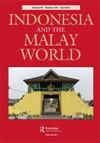英语在巴里克帕潘主要通篇语言景观中的使用
IF 0.9
3区 社会学
0 ASIAN STUDIES
引用次数: 6
摘要
摘要认识到英语在全球的声望及其在印尼的突出地位,本研究考察了印尼城市巴里克帕潘(位于婆罗洲岛的东加里曼丹省城市)主要干道旁路边标牌的语言景观。我们发现,有些标志完全是印尼语的,有些完全是英语的,有些是两种语言的结合,而标志中没有“当地”语言。在语言生产中应用巴赫金的异语理论,并结合印尼最新的语言法,我们研究了标牌中语言使用的指数维度,其中印尼语是民族主义定位的向心力,英语代表离心力,可能会破坏民族语言和相关的身份地位。自上而下的官方标识和自下而上的非官方标识故意将英语与印尼语混合(代码转换),其复杂性显而易见。我们认为,与印尼法律相冲突的英语“侵入性”使用反映了向心理想化的国家身份和离心外国影响之间的身份定位之争。最令人感兴趣的是这些看似竞争的力量通过有意的混合语言使用(代码转换)的交叉。这表明了复杂、混合的身份定位,将民族主义情绪与渴望更全球化的身份定位的向外凝视相结合。本文章由计算机程序翻译,如有差异,请以英文原文为准。
English usage in the linguistic landscape of Balikpapan’s main Thoroughfares
ABSTRACT Recognising the global prestige of English and its prominence in Indonesia, this study examines the linguistic landscape of roadside signage alongside main thoroughfares in the Indonesian city of Balikpapan, a provincial city of East Kalimantan, on the island of Borneo. We find that some signs are entirely in Indonesian, some are entirely in English and some combine both languages, while there is an absence of ‘local’ languages in signage. Applying Bakhtin’s theories of heteroglossia in language production, and contextualised by Indonesia’s most recent language laws, we examine the indexical dimensions of language use in signage where Indonesian is a centripetal force towards nationalistic positioning and English represents a centrifugal force, potentially undermining the national language and associated identity positions. Complexity is evident in the deliberate mixing of English with Indonesian languages (code switching) in top-down official signage and in bottom-up non-official signage. We suggest that the ‘invasive’ use of English that conflicts with Indonesian laws reflects a contestation of identity positioning between a centripetal idealised national identity and a centrifugal foreign influence. Of greatest interest is the intersection of these seemingly competing forces through deliberate blended language use (code switching). This suggests complex, hybridised identity positioning that combines nationalistic sentiment with an outward gaze that aspires towards more globalised identity positions.
求助全文
通过发布文献求助,成功后即可免费获取论文全文。
去求助
来源期刊

Indonesia and the Malay World
ASIAN STUDIES-
CiteScore
2.00
自引率
0.00%
发文量
17
期刊介绍:
Indonesia and the Malay World is a peer-reviewed journal that is committed to the publication of scholarship in the arts and humanities on maritime Southeast Asia. It particularly focuses on the study of the languages, literatures, art, archaeology, history, religion, anthropology, performing arts, cinema and tourism of the region. In addition to welcoming individual articles, it also publishes special issues focusing on a particular theme or region. The journal is published three times a year, in March, July, and November.
 求助内容:
求助内容: 应助结果提醒方式:
应助结果提醒方式:


